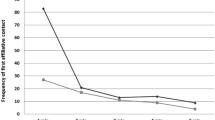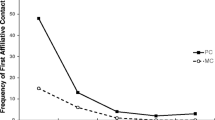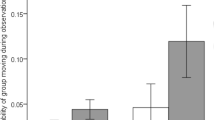Abstract
Social animals benefit from group living. However, competition for limited resources may lead to agonistic conflicts. These conflicts can affect the behavior and the social relationships, not only of the individuals involved in the confrontation, but also of bystanders. The aim of this study was to describe postconflict affiliative interactions among bystanders (quadratic affiliation) in a captive group of Japanese macaques (Macaca fuscata) and test whether 1) after observing a conflict bystanders tend to interact with other bystanders, 2) conflicts increase bystanders’ rates of self-directed behaviors (SDBs), 3) postconflict rates of SDBs mediate affiliative interactions between bystanders, and 4) quadratic affiliation decreases rates of SDBs to baseline levels. We used the postconflict matched-control (PC-MC) method (5 min focal samples) to record bystanders’ behavior (156 PC-MC pairs from 15 subjects). Results show that bystanders’ rates of SDBs increased above baseline levels after conflicts. Bystanders responded to conflicts by increasing affiliation with other bystanders (mainly with close associates) but not with former combatants. After quadratic affiliation, rates of SDBs decreased to baseline levels. Together with previous findings, these results support the idea that quadratic affiliation is a tension reduction mechanism in less tolerant species.


Similar content being viewed by others
References
Altmann, J. (1974). Observational study of behavior: Sampling methods. Behaviour, 49, 227–265.
Aureli, F. (1997). Post-conflict anxiety in nonhuman primates: The mediating role of emotion in conflict resolution. Aggressive Behavior, 23, 315–328.
Aureli, F., Cords, M., & van Schaik, C. P. (2002). Conflict resolution following aggression in gregarious animals: A predictive framework. Animal Behaviour, 64, 325–343.
Aureli, F., Cozzolino, R., Cordischi, C., & Scucchi, S. (1992). Kin-oriented redirection among Japanese macaques: An expression of a revenge system? Animal Behaviour, 44, 283–291.
Aureli, F., & de Waal, F. B. M. (2000). Why natural conflict resolution? In F. Aureli & F. B. M. de Waal (Eds.), Natural conflict resolution (pp. 3–10). Berkeley: University of California Press.
Aureli, F., & Schaffner, C. M. (2002). Relationship assessment through emotional mediation. Behaviour, 139, 393–420.
Aureli, F., Veenema, H. C., van Panthaleon van Eck, C. J., & Hooff, J. A. R. A. M., van. (1993). Reconciliation, consolation, and redirection in Japanese macaques (Macaca fuscata). Behaviour, 124, 1–21.
Campbell, C. J., Fuentes, A., Mackinnon, K. C., Panger, M., & Bearder, S. K. (2007). Primates in perspective. Oxford: Oxford University Press.
Castles, D. L., Whiten, A., & Aureli, F. (1999). Social anxiety, relationships and self-directed behaviour among wild female olive baboons. Animal Behaviour, 58, 1207–1215.
Colmenares, F. (2006). Is postconflict affiliation in captive nonhuman primates an artifact of captivity? International Journal of Primatology, 27, 1311–1336.
Cords, M., & Aureli, F. (2000). Reconciliation and relationship qualities. In F. Aureli & F. B. M. de Waal (Eds.), Natural conflict resolution (pp. 177–198). Berkeley: University of California Press.
De Marco, A., Cozzolino, R., Dessì-Fulgheri, F., & Thierry, B. (2010). Conflicts induce affiliative interactions among bystanders in a tolerant species of macaque (Macaca tonkeana). Animal Behaviour, 80, 197–203.
de Waal, F. B. M., & van Roosmalen, A. (1979). Reconciliation and consolation among chimpanzees. Behavioral Ecology and Sociobiology, 5, 55–66.
de Waal, F. B. M., & Yoshihara, D. (1983). Reconciliation and redirected affection in rhesus monkeys. Behaviour, 85, 224–241.
Fraser, O. N., & Aureli, F. (2008). Reconciliation, consolation and postconflict behavioral specificity in chimpanzees. American Journal of Primatology, 70, 1114–1123.
Fraser, O. N., Koski, S. E., Wittig, R. M., & Aureli, F. (2009). Why are bystanders friendly to recipients of aggression? Communicative and Integrative Biology, 2, 1–7.
Judge, P. G., & Bachmann, K. A. (2013). Witnessing reconciliation reduces arousal of bystanders in a baboon group (Papio hamadryas hamadryas). Animal Behaviour, 85, 1–9.
Judge, P. G., & Mullen, S. H. (2005). Quadratic postconflict affiliation among bystanders in a hamadryas baboon group. Animal Behaviour, 69, 1345–1355.
Kutsukake, N., & Castles, D. L. (2001). Reconciliation and variation in post-conflict stress in Japanese macaques (Macaca fuscata fuscata): Testing the integrated hypothesis. Animal Cognition, 4, 259–268.
Leone, A., Mignini, M., Mancini, G., & Palagi, E. (2010). Aggression does not increase friendly contacts among bystanders in geladas (Theropithecus gelada). Primates, 51, 299–305.
Maestripieri, D., Schino, G., Aureli, F., & Troisi, A. (1992). A modest proposal: Displacement activities as an indicator of emotions in primates. Animal Behaviour, 44, 967–979.
Majolo, B., & Koyama, N. (2006). Seasonal effects on reconciliation in Macaca fuscata yakui. International Journal of Primatology, 27, 1383–1397.
Majolo, B., Ventura, R., & Koyama, N. (2005). Postconflict behavior among male Japanese macaques. International Journal of Primatology, 26, 321–336.
Nakayama, K. (2004). Observing conspecifics scratching induces a contagion of scratching in Japanese monkeys (Macaca fuscata). Journal of Comparative Psychology, 118, 20–24.
Palagi, E., Dall’Olio, S., Demuru, E., & Stanyon, R. (2014). Exploring the evolutionary foundations of empathy: Consolation in monkeys. Evolution and Human Behavior, 35, 341–349.
Patzelt, A., Pirow, R., & Fischer, J. (2009). Post-conflict affiliation in Barbary macaques is influenced by conflict characteristics and relationship quality, but does not diminish short-term renewed aggression. Ethology, 115, 658–670.
Romero, T., Castellanos, M. A., & de Waal, F. B. M. (2010). Consolation as possible expression of sympathetic concern among chimpanzees. Proceedings of the National Academy of Sciences of the USA, 107, 12110–12115.
Romero, T., Colmenares, F., & Aureli, F. (2009). Testing the function of reconciliation and third-party affiliation for aggressors in hamadryas baboons (Papio hamadryas hamadryas). American Journal of Primatology, 71, 60–69.
Schino, G., Rosati, L., Geminiani, S., & Aureli, F. (2007). Post-conflict anxiety in Japanese macaques (Macaca fuscata): Aggressor’s and victim’s perspectives. Ethology, 113, 1081–1088.
Silk, J. B., Altmann, J., & Alberts, S. C. (2006). Social relationships among adult female baboons (Papio cynocephalus) I. Variation in the strength of social bonds. Behavioral Ecology and Sociobiology, 61, 183–195.
Silk, J. B., Cheney, D., & Seyfarth, R. (2013). A practical guide to the study of social relationships. Evolutionary Anthropology, 22, 213–225.
Thierry, B. (2000). Covariation of conflict management patterns across macaque species. In F. Aureli & F. B. M. de Waal (Eds.), Natural conflict resolution (pp. 106–128). Berkeley: University of California Press.
Veenema, H. C., Das, M., & Aureli, F. (1994). Methodological improvements for the study of reconciliation. Behavioural Processes, 31, 29–37.
Acknowledgments
We express special thanks to Lisbon Zoo for permission to conduct this study. We also acknowledge Joanna Setchell, the editor of International Journal of Primatology, and two anonymous reviewers for valuable comments on previous versions of the manuscript. This study was partially funded by a Fundação para a Ciência e Tecnologia grant: SFRH/BPD/82522/201.
Author information
Authors and Affiliations
Corresponding author
Rights and permissions
About this article
Cite this article
Daniel, J.R., Alves, R.L. Postconflict Affiliation Among Bystanders in a Captive Group of Japanese Macaques (Macaca fuscata). Int J Primatol 36, 259–268 (2015). https://doi.org/10.1007/s10764-015-9822-8
Received:
Accepted:
Published:
Issue Date:
DOI: https://doi.org/10.1007/s10764-015-9822-8




